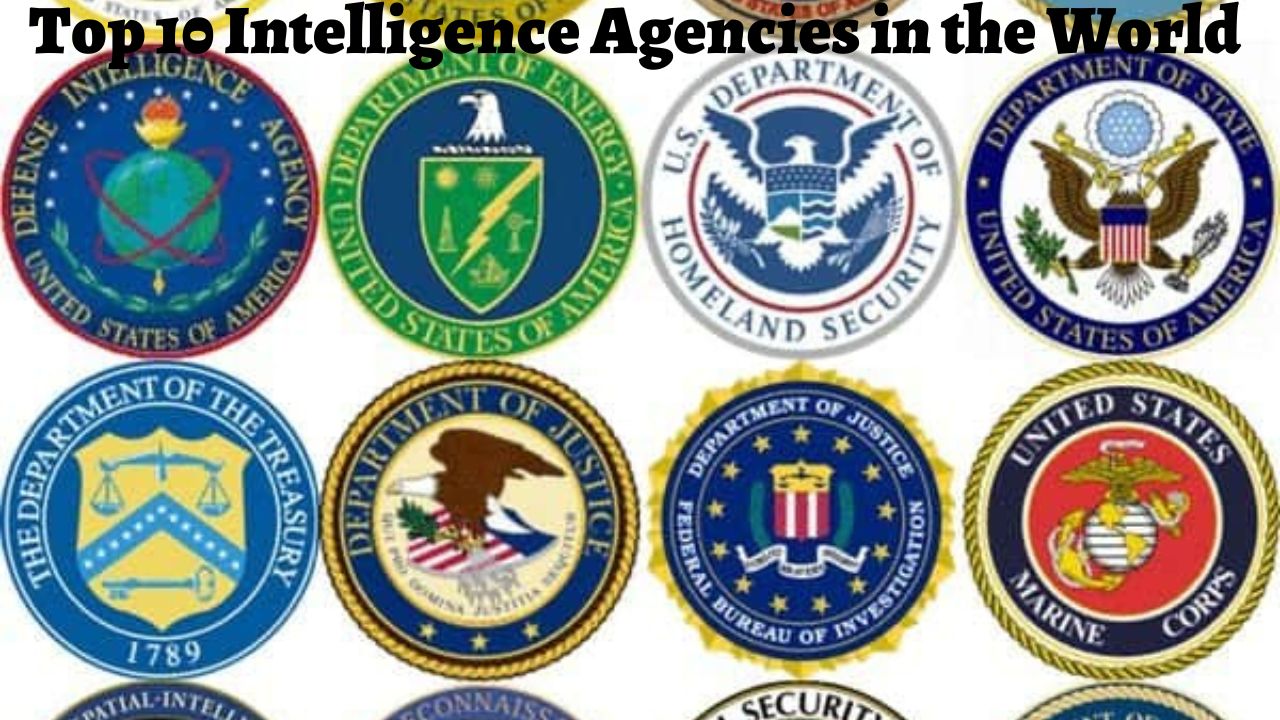Top 10 intelligence agencies in the world: The intelligence agency of a country serves as the nervous system of that country’s defence system. It is responsible for providing vital intelligence to the armed forces and law enforcement agencies regarding any potential hazard to the nation’s internal and external security. They are responsible for gathering, analyzing, and utilising information that is not accessible to the general public.
These top 10 intelligence agencies in the world collect information using a variety of techniques, including signal collection or interception, espionage, and cryptanalysis, among others. Almost every country in the world has more than one operational intelligence agency or secret service, but only one stands out. Numerous factors, such as rigorous training, cutting-edge technology, a vast budget, etc., contribute to an espionage agency’s superior performance.
Top 10 intelligence agencies in the world
1. The United States Central Intelligence Agency
It was founded by President Harry S. Truman in 1947. It was established to facilitate the dissemination of foreign policy intelligence and analysis across the nation. It is the most potent intelligence agency in the United States. The majority of the organisation’s resources and personnel are devoted to gathering foreign intelligence, while only a small quantity of domestic data is collected.
Counterterrorism is the CIA’s top priority, followed by cyber intelligence, counterintelligence, nonproliferation, and informing/warning American leaders about significant international events. This agency has always been the subject of numerous domestic and international controversies.
2. Secret Intelligence Service – Great Britain
The British Secret Intelligence Service, also known as MI6, is one of the most prestigious intelligence agencies in the globe. This launched in 1909, and as the Chief of the Secret Intelligence Service, it answers immediately to the Foreign Secretary. Ninety years after its founding, in 1994, it received formal recognition. SIS is limited to groups and individuals outside the British Isles, in contrast to MI5. Among the significant historical events in which this organisation participated were the Cold War, the Second World War, and countless regional conflicts around the globe.
3. Mossad – Israël
Israel’s intelligence agency, Mossad, is the most proficient, one of the oldest, and one of the most feared in the world. Mossad is a foreign intelligence organisation comparable to the CIA. In addition to gathering intelligence, it is also tasked with counterterrorism and covert operations abroad. Mossad established the Libratad technological innovation fund to invest in emerging technology firms.
Kidon and Metsada are the agency’s counterterrorism divisions. For extremely delicate missions. A group of highly skilled soldiers known as Kidon carry out high-profile murders and acts of worldwide sabotage. Mossad’s clandestine operation is in the best interests of the global Jewish community.
4. India’s Research And Analysis Wing
After the collapse of India’s intelligence during the 1962 Sino-Indian War, it was established in 1968. It was a significant setback for the intelligence bureau, which was responsible for the country’s external and internal security at the time. For future prevention of such catastrophic events, the government of India established the Research and Analysis Wing, a completely external intelligence agency whose responsibilities include monitoring arms and narcotics smuggling into the country and gathering intelligence from foreign nations regarding the country’s national security.
5. The GCHQ and the NSA
It is a security organisation responsible for amassing intelligence information via signals intelligence for the government and armed forces of the United Kingdom. Government Communication Headquarters is its formal name, and it was founded in 1919. Composite Signals Organisation (GCHQ Bude) and National Cyber Security Center comprise this organisation. (NCSC). In the United Kingdom, the National Cyber Security Center advises the government on cyber security and threat assessments, whereas GCHQ Bude is responsible for amassing broader intelligence operations such as cable data interception and satellite.
The NSA (National Security Agency) of the United States, which shares this location, is one of the most well-known intelligence agencies in the world. This agency is responsible for analysing and collecting security-related information from abroad and within the United States to assist other federal security agencies. It is also involved in mass surveillance via hacking and covert monitoring programmes.
6. Russia’s Foreign Intelligence Service (SVR RF)
SVR RF, or the Foreign Intelligence Service of the Russian Federation, replaced the KGB as Russia’s external agency in 1991. Its numerous responsibilities include strategic intelligence collection, economic espionage, and the protection of Russian officials abroad. It has played a more significant role in Russia’s foreign policy than its ministry. This intelligence agency collaborates with the GRU, Russia’s foreign military intelligence branch, to conduct covert operations and espionage in numerous foreign nations.
7. China’s Ministry of State Security
MSS, or the Ministry of State Security, is the civilian agency in the People’s Republic of China responsible for external and domestic intelligence gathering and counterintelligence.
Following the merger of the Ministry of Public Security’s Central Investigation Department and counterintelligence division, its current organisational framework emerged in 1983.(the preceding foreign intelligence agency).
In recent years, the MSS has conducted espionage operations against several host nations, including the United States, where Chinese economic and cyberattacks have caused between $300 billion and $445 billion in annual economic harm.
8. Germany’s Federal Intelligence Service (BND)
The CIA helped establish the Bundesnachrichtendienst (BND), a German international intelligence service, in 1956 during the Cold War. It was the only means for Western intelligence agencies to closely monitor the eastern bloc years after its establishment. BND stood out as Western Asia’s most knowledgeable intelligence organisation in the 1960s and 1970s.
This organisation is responsible for collecting and analysing data regarding counter-proliferation, international terrorism, organised crime, and drug trafficking. It engages in bulk surveillance similar to the United States CIA. In 2016, a BND officer effectively negotiated a prisoner exchange between the Shia Islamist militant group Hezbollah and Israel, which occurred in 2018. The BND has been a successful mediator between the two parties in the past.
9. France’s General Directorate for External Security
The General Directorate for External Security, also known as DGSE, is one of the world’s most influential intelligence agencies. It is in charge of counterintelligence, intelligence gathering, and special operations on foreign soil and is immediately under the direction of the French Ministry of Defense.
Throughout the 1970s and 1980s, DGSR extensively spied on some of the largest American technology companies. This agency has participated in multiple civil conflicts, counterterrorism efforts, and other global operations over the years.
Cheng Ming Festival 2023: Date, History, Facts about Cheng Ming Festival
10. Australia’s Secret Intelligence Services
Executive order established the Australian Secret Intelligence Service (ASIS) in 1952 as the external component of the Australian Intelligence Community. It was first disclosed to the public in 1972, nearly two decades later, when a news article detailed its espionage activities in Asian countries. This organisation gave the responsibility of amassing foreign intelligence concerning the nation’s strategic interests and domestic security. In 2012, during a press conference, the Director-General of ASIS stated that the organisation is expanding its presence in the world’s most unstable region.
These intelligence organisations gather information using a range of strategies, including espionage, cryptanalysis, signal collection or interception, and others. There are multiple operational intelligence agencies or secret services in almost every nation, but only one sticks out. A wide range of elements, including strict training, state-of-the-art equipment, a sizable budget, etc. These add to an espionage agency’s superior performance.



